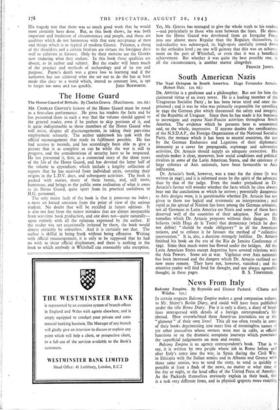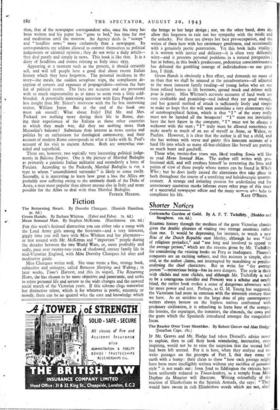News From Italy
Balcony. Empire. By Reynolds and Eleanor Packard. (Chatto and Windus. iss.)
IN certain respects Balcony Empire makes a good companion volume to Mr. Shirer's Berlin Diary, and could well have been published under the title Rome Diary. For it is only a diary, a diary of head- lines interspersed with details of a foreign correspondent's life abroad. How overwhelmed these American journalists are at the " glamour " of their own lives! This all too often results in some of their books degenerating into mere lists of meaningless names of yet other journalists whose owners were met in caas, at official functions or on the dramatic aeroplane journeys which. punctuate the superficial judgements on men and events. Balcony Empire is an agency correspondent's book. That is to say, it is written by two people whose job in Rome before and after Italy's entry- into the war, in Spain during the Civil War, in Ethiopia with the Italian armies and in Albania and Greece with those same armies, -was to send the story, to send. as quickly as possible at least a flash of the news, no matter at what time of the day or night, to the head office of the United Press of America. As the Packards themselves enviously explain in their book, this is a task very different from, and in physical aspects more exacting
than, that of the newspaper correspondent who, once his story has been written and his paper has " gone to bed,': has time for rest and meditation until the morrow. An Agency deals in " scoops " and " headline news more exclusively than a newspaper. Its correspondents are seldom allowed to commit themselves to political judgements or editorial opinion ; they do not write a daily article— they deal purely and simply in news. This book is like that. It is a diary of headlines and events relating to Italy since 1935.
Appearing at a moment such as the present, it should certainly sell, and will tell people here a good deal about recent Italian history which they have forgotten. The personal incidents in the story—the meals, the sudden aeroplane trips, the complacent de- ception of censors and exposure of propagandists—enliven the bare list of political events. The facts are accurate and are presented with so much impersonality as at times to seem even a little cold- blooded. A potentially interesting interview with Ezra Pound shows less insight than Mr. Shirer's interview with the far less interesting traitor, William Joyce. But at the end of the book one must ask oneself : What about Italy? Did Mr. and Mrs. Packard see nothing more during their life in Rome, dur- ing their experiences of the Italians in those other countries in which they made war, did they see nothing more than Mussolini's balcony? Substitute their interest in news stories and politics by an enthusiasm for theological controversy, and their account of modern Rome corresponds in what it lacks with St. Paul's account of his visit to ancient Athens. Both are somewhat one- sided and superficial.
There are, however, two topically very interesting political judge- ments in Balcony Empire. One is the picture of Marshal Badoglio as primarily a patriotic Italian militarist and secondarily a hater of Fascists. According to the Parka rds, Marshal• Badoglio is rot a type to whom " unconditional surrender " is likely to come easily. Secondly, it is interesting to learn how great a loss the Allies are probably now suffering owing to the untimely death of the Duke of Aosta, a man more popular than almost anyone else in Italy and more possible for the Allies to deal with than Marshal Badoglio. PATRICK HENSON.



























 Previous page
Previous page